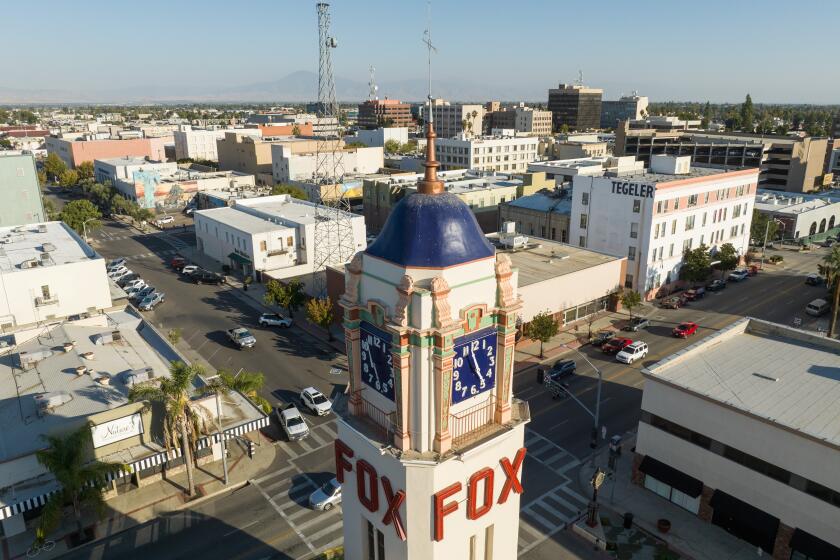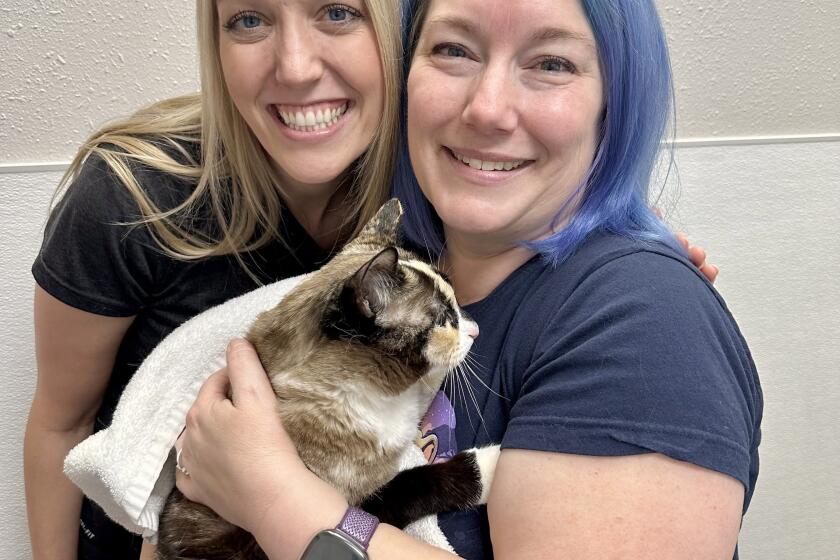Pair Who Refused Screening and Were Fired Seek $1 Million : Hospital Sued Over Drug Test for Workers
Two former employees of a North Hollywood hospital who were fired last year when they refused to take an employee drug screening test have sued the hospital for $1 million, charging the test was an invasion of their privacy and a violation of the state labor code.
Mitzi Olson, a licensed nurse from Woodland Hills, and Troy Gates, a certified nursing assistant from Hidden Hills, charge in the suit against the Coldwater Canyon Hospital that the drug tests were “highly intrusive and accusative.”
Dismissed After Test Began
The two employees were dismissed by the hospital, which provides mental health services and alcoholism and drug-abuse treatment, shortly after the drug screening test was implemented last March.
Olson and Gates say in the suit that they have no history of drug use and that they were “justified in refusing” to submit to the tests. Hospital officials, who confirmed the firings, would not comment on whether the two were considered to have drug-use problems.
The Coldwater Canyon Hospital, owned and operated by the Chatsworth-based Health West Foundation, established the drug-screening requirement “to ensure that staff members are not using illegal drugs,” said Patricia Klein, a spokeswoman for the hospital. Although drug use by the hospital staff has not been a problem, she said, about 75% of the 150 staff members are recovered alcoholics or drug users.
“It is done as a preventive measure,” she said. “We want sobriety here, and that includes our staff.”
Olson and Gates charge in the suit filed last week in Burbank Superior Court that they were fired after refusing to properly complete and sign an “Employees’ Drug Screen Acknowledgment and Agreement.” The agreement states that employees would be required to take random urine tests to detect drugs in their bodies.
Called an ‘Insult’
Gates, who had worked for two years at the hospital, refused to sign the agreement because it was “an insult to me as a human being,” according to a memo included in court documents. Olson, who had worked for one year at the hospital, completed the agreement form improperly, signing it in the wrong space and writing on it that it violated state labor laws.
Hospital officials said all employees were required to sign the agreement when the program was instituted and that new staff members are now required to sign it as a condition of employment.
Klein said she did not know how many employees were fired because of the new policy, but Martin B. Snyder, an attorney for Olson and Gates, said he knows of at least eight.
“There is a rational reason for subjecting the recovering addicts to periodic tests because they came to the hospital for drug rehabilitation in the first place,” Snyder said. “But we don’t feel the same standard should be applied to the professional staff.”
Ross Goldberg, vice president of public relations for Health West, a nonprofit foundation that also operates the Northridge Hospital Medical Center, said drug screening of employees is not uncommon at alcoholism and drug-abuse treatment centers. He said the company’s Pasadena hospital for drug and alcohol treatment has a similar requirement, which was unsuccessfully challenged by some employees last year in Pasadena Superior Court.
“It is unfortunate that someone is suing us, but we stand by our policy,” he said. “We think it is within our legal rights and, more than that, it is a valuable reassurance to our patients to know that a program like this is in place.”
Olson, who Snyder said is in her 40s, and Gates, 20, allege in the suit that the test violates California labor code provisions that prohibit lie detector tests and “similar tests” as a condition of employment. Snyder said the two contend that the Health West urine tests “clearly” fall within that prohibition.
Representatives from several drug-treatment centers and health associations throughout the United States said that employee drug-screening tests, although not unique to Health West, are not commonplace in the health industry.
Comprehensive Care Corp., for example, the largest private provider of alcohol and drug-abuse treatment in the nation, has no drug screening test for its employees, according to Gary Mangiofico, manager of professional services for the company. Mangiofico said that the firm requires two years of sobriety for new employees with previous alcohol or drug problems, but that no random medical tests are required.
“Our perception is that someone who is hired in our facility is considered to be a professional, regardless of whether they are recovering,” he said. “We don’t have the philosophy that a job requirement should be policing whether they are still having a problem.”
No Specific Requirements
Miranda Mikos, spokeswoman for the Joint Commission on Accreditation of Hospitals based in Chicago, said that organization requires employee “health guarantees” before accrediting centers for treatment of drug and alcohol abuse. But, she said, there are no specific requirements for drug-screening tests. Coldwater has neither applied for nor received accreditation, Mikos said.
Luis Montez, clinical director of the Narcotics Prevention Assn. in East Los Angeles, said such tests are standard at that association, which operates several facilities, including an outpatient methadone clinic. He said there is an in-house policy that all staff members be tested periodically.
“Personally, I think it is demeaning,” Montez said. “I don’t like it. But it is a good policy. We are dealing with very powerful substances and we have some extremely hard-core cases. There are documented cases where there are doctors and nurses who have abused these drugs. The tests protect the overall program and its administration.”
More to Read
Start your day right
Sign up for Essential California for news, features and recommendations from the L.A. Times and beyond in your inbox six days a week.
You may occasionally receive promotional content from the Los Angeles Times.






